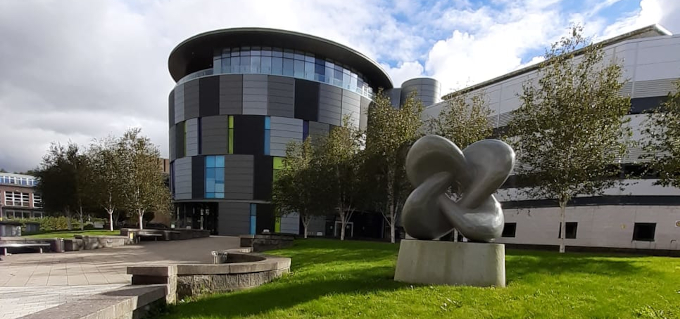

A Yorkshire and Durham Geometry Day will take place on Wednesday December 9, 2020 (virtually) in the Department of Mathematical Sciences at Durham University. |
ProgrammeAll times are GMT (UK time). 1:00 p.m.- 2:00 p.m. Martin Kerin (National University of Ireland Galway) "A pot-pourri of non-negatively curved 7-manifolds." Manifolds with non-negative sectional curvature are rare and difficult to find, with interesting topological phenomena traditionally being restricted by a dearth of methods of construction. In this talk, I will describe a large family of seven-dimensional manifolds with non-negative curvature, leading to examples of exotic diffeomorphism types, non-standard homotopy types and fake versions of familiar friends. This is based on joint work with Sebastian Goette and Krishnan Shankar. 2:15 p.m. - 2:45 p.m. Supanat Kamtue (Durham University) "Ricci curvature of discrete Markov chains as geodesic convexity of the entropy" In 2011, Erbar and Maas study a new definition of Ricci curvature for discrete Markov chains. This notion of Ricci curvature is characterized by the displacement convexity (in the context of Optimal transport) of the entropy, and it is in the spirit of the famous work by Lott, Sturm and Villani (for a general class of metric measure spaces). Two equivalent definitions of this Ricci curvature are also given by an inequality related to Bochner’s formula and a gradient estimate for the heat semigroup. In this talk, I will narrate the work of Erbar and Maas from the viewpoint of Otto’s calculus and look at geometric structure of the space of probability measures. At the end, I will mention my result to obtain a diameter bound of the underlying graph of a Markov chain with positive Ricci curvature. 3:00 p.m. - 4:00 p.m. Alma Albujer (Universidad de Córdoba, Spain) "Non-degenerate surfaces with the same Riemannian and Lorentzian mean curvature" Abstract: Let us consider the family of homogeneous 3-manifolds with isometry group of dimension 4, \(\mathbb{E}(\kappa,\tau)\). As it is well known, such manifolds are Riemannian fibrations over a 2-dimensional space form, the fibers are geodesics and there exists a one-parameter family of translations along the fibers, generated by a Killing vector field \(\xi\). With an analogous definition, but in the case where the Killing vector field \(\xi\) is timelike, we get the Lorentzian homogeneous spaces \(\mathbb{L}(\kappa,\tau)\). Therefore, any non-degenerate surface \(\Sigma\) in \(\mathbb{L}(\kappa,\tau)\) can be endowed with two different non-degenerate metrics, the ones induced by \(\mathbb{E}(\kappa,\tau)\) and by \(\mathbb{L}(\kappa,\tau)\). Consequently, we can define two different mean curvature functions on \(\Sigma\), \(H_L\) and \(H_R\) respectively. Along this talk we will study some geometric properties of non-degenerate surfaces in \(\mathbb{L}(\kappa,\tau)\) such that \(H_L=H_R\). Specifically, we prove that in the case where \(H_L=H_R=0\) those surfaces are ruled surfaces. This result extends a previous one by Kobayashi in the case \(\kappa=\tau=0\) and by Kim, Koh, Shin and Yang when \(\tau=0\). Furthermore, in the case \(\tau=0\) we give some uniqueness results for the general case where \(H_L=H_R\) not necessarily constant. The results presented in this talk are part of a joint work with E. M. Alarcón, M. Caballero and F. R. dos Santos. |
Zoom informationYou can access the meeting here: https://durhamuniversity.zoom.us/j/92028136136?pwd=ekhhYVVMRlNKOUliRGwxVTNraDhFZz09 Meeting ID: 920 2813 6136 Passcode: 556221 |
|
Yorkshire and Durham Geometry Days are jointly organised by the Universities of Durham, Leeds and York, and occur at a frequency of three meetings per year. Financial support is provided by the London Mathematical Society through a Scheme 3 grant, currently administered by the University of York. Additional support is provided by the Department of Mathematics, Durham University. The local organizers are: |